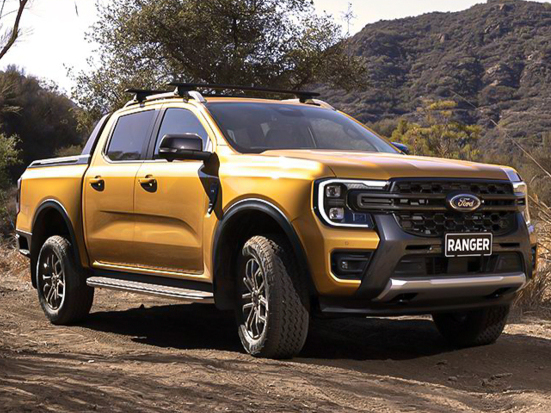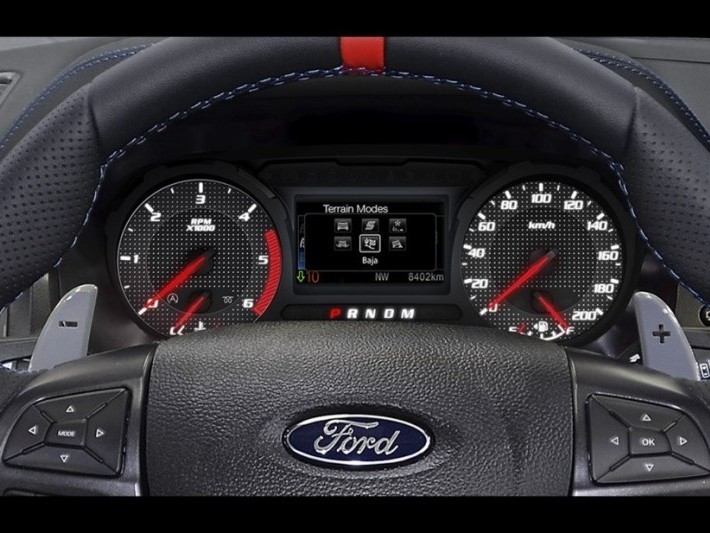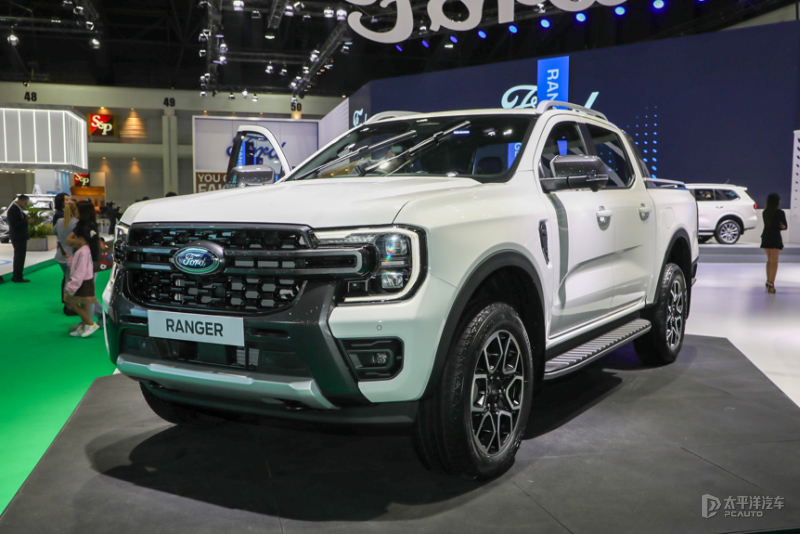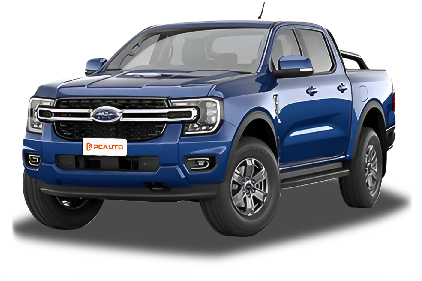Q
Is a 2020 Ford Ranger any good?
The 2020 Ford Ranger is a solid all-around pickup truck. It comes with either a 2.0-liter turbo diesel engine or a 3.2-liter five-cylinder diesel, both offering plenty of power and decent fuel economy—great for daily commuting and hauling needs. The interior is designed with practicality in mind, featuring goodies like the SYNC 3 infotainment system and a backup camera that make driving easier. The suspension strikes a good balance between comfort and off-road capability, and the 4WD system holds its own when the going gets tough. It holds its value reasonably well on the used market, maintenance costs are pretty manageable, and parts are easy to come by. Speaking of pickups, they’ve really stepped up their versatility game lately. Beyond the traditional workhorse role, manufacturers are putting more focus on family-friendly comfort—think better rear-seat space and upgraded entertainment features—making these trucks a fit for more diverse lifestyles. If you’re eyeing a used one, definitely check the service records and the condition of the 4WD system to make sure it hasn’t been thrashed in hardcore off-roading.
Special Disclaimer: This content is published by users and does not represent the views or position of PCauto.
Related Q&A
Q
What engine failure is Ford recalling in 2020?
Ford's 2020 engine recall primarily affected certain models equipped with the 1.5-liter EcoBoost four-cylinder engine, which had a potential coolant leak risk that could lead to engine overheating and even damage. Ford launched the recall to replace the relevant components. As one of Ford's core technologies, EcoBoost engines are typically known for their efficiency and fuel economy, but like all complex mechanical systems, design or manufacturing flaws can emerge under specific conditions. The prompt recall demonstrates the manufacturer's responsible attitude toward consumers. For car owners, if you notice the engine temperature rising abnormally or coolant levels dropping without reason, you should contact a dealer for inspection immediately. Addressing such issues early usually prevents more serious damage. Regular maintenance and following the manufacturer's recommended service intervals can also effectively reduce the risk of engine failures—after all, prevention is better than cure when it comes to car maintenance.
Q
Is there a recall on the 2020 Ford Ranger transmission?
Regarding the 2020 Ford Ranger transmission recall issue, there are currently no global recall records specifically for this model's transmission. However, owners are advised to regularly check for the latest announcements through official channels, as recall information can vary by region and production batch. The SelectShift automatic transmission featured in this model is a mature technology and generally performs reliably under normal conditions. If you experience issues like rough shifting, unusual noises, or warning lights illuminating, it's crucial to contact an authorized service center promptly for diagnosis. For routine maintenance, follow the manual's recommendations for transmission fluid change intervals—typically around every 60,000 kilometers, though this can be shortened under severe driving conditions. For pickup trucks, transmission durability is especially important, so owners who frequently haul heavy loads or tow should pay extra attention to their driving habits, avoiding prolonged low-gear, high-rev operation. If you have any concerns about your vehicle's condition, you can visit a nearby dealership for a free inspection, and Ford's after-sales system can quickly retrieve your vehicle's complete service history and any potential service campaign notifications.
Q
How long should a 2020 Ford Ranger last?
The 2020 Ford Ranger can typically hit 200,000 to 300,000 kilometers – or even more – with regular use and proper maintenance. Its lifespan really hinges on driving habits, road conditions, and how often you keep up with servicing. Under the hood, the 2.0-liter turbo diesel engine paired with the 10-speed auto is a solid, proven combo that’s built to last. Stick to regular oil changes, filter replacements, and the manufacturer’s recommended service schedule, and this truck will keep performing reliably for years.
What’s more, the Ranger’s body structure and chassis are designed to handle our local mix of road surfaces, and it’s got decent corrosion resistance to boot – both big pluses for longevity. If you want to maximize its lifespan, make it a habit to check the cooling system, brakes, and drivetrain regularly; these systems take a lot of abuse and their condition directly impacts how long the truck lasts.
Daily city driving with proper care? The Ranger will go the distance. But if you’re putting it through heavy loads or regular off-roading, expect more wear on key components and plan for more frequent inspections. Either way, knowing these factors helps you stay on top of maintenance and keep your Ranger running strong for the long haul.
Q
Is the 2020 Ford Ranger a V6?
The 2020 Ford Ranger doesn't offer a V6 engine option in the local market; instead, the entire lineup comes with turbocharged diesel powertrains that prioritize fuel efficiency and torque output. These include a 2.0-liter four-cylinder twin-turbo and a 3.2-liter five-cylinder turbo diesel engine. The 3.2-liter variant churns out 197 horsepower and 470 Nm of torque, paired with a 6-speed automatic transmission—configuration that's particularly well-suited for frequent heavy loading or towing scenarios. While some overseas markets, like the North American version, offer a 2.7-liter V6 gasoline engine, the current setup actually aligns better with real-world needs considering Southeast Asian users' high acceptance of diesel vehicles and the diesel engine's advantage of high torque at low revs. It's worth noting that small-displacement turbocharging technology has become a mainstream trend in the pickup truck segment in recent years. It not only meets increasingly stringent emission regulations but also can deliver performance close to traditional large-displacement engines through tuning. Diesel engines like those in the Ranger, which employ advanced fuel injection technology and variable geometry turbos, also have significant advantages in terms of durability and maintenance costs.
Q
How much does a 2020 Ford Ranger cost?
Prices for the 2020 Ford Ranger vary depending on trim level and condition. Brand-new models typically range from RM120,000 to RM180,000, depending on the powertrain option—like the 2.0L single-turbo, 2.0L bi-turbo, or 3.2L diesel engine—and trim level (XL, XLT, or Wildtrak). Used market prices are lower, around RM80,000 to RM140,000, depending on mileage, maintenance history, and added features. This pickup is popular for its solid off-road capability, practical cargo space, and reliable durability, making it a great fit for users who need something that handles both work and play. The Ranger also comes with decent tech, including the SYNC 3 infotainment system, adaptive cruise control, and a 360-degree camera, which boost driving convenience. Plus, it’s got tons of modification potential—many owners upgrade the suspension, tires, or exterior for a more personalized look and better performance to suit their needs. If you’re thinking about buying one, it’s a good idea to compare deals from different dealers and check the service history of used models to make sure they’re in good shape.
Q
What is the V6 engine in the Raptor 2023?
The 2023 Ford Raptor is powered by a 3.5-liter EcoBoost twin-turbocharged V6 engine, renowned for its impressive power delivery and fuel efficiency. It cranks out 450 horsepower and 691 Nm of peak torque, paired with a 10-speed automatic transmission that delivers robust acceleration and off-road capability. The V6 design maintains strong power output while being lighter than a traditional V8, enhancing overall vehicle handling and fuel economy. This engine also features advanced turbocharging tech and direct injection, churning out ample torque at low revs—perfect for both off-roading adventures and highway cruises. For performance truck enthusiasts, the Raptor's V6 doesn't just handle daily drives; it excels in tough terrain with outstanding capability. Plus, the turbocharging setup strikes a solid balance between eco-friendliness and performance, keeping up with modern automotive tech trends.
Q
How does the 2023 Raptor compare to the TRX?
The 2023 Ford F-150 Raptor and Ram 1500 TRX are both icons of high-performance full-size pickups, but their design philosophies and performance focuses set them apart. The Raptor packs a 3.5L EcoBoost V6 twin-turbo engine with 450 horsepower, emphasizing high-speed off-road capability and lightweight construction. It comes with upgraded FOX Live Valve dampers and a smarter terrain management system, making it ideal for long-distance trail runs and complex landscapes. The TRX, on the other hand, rocks a 6.2L supercharged Hemi V8 cranking out a beastly 702 horsepower, prioritizing straight-line acceleration and extreme off-road dominance. Equipped with Bilstein Black Hawk e2 adaptive shocks, it’s more for folks chasing raw power and old-school rugged off-roading. Inside, the Raptor leans into utility and tech, standard with a 12-inch touchscreen and SYNC 4, while the TRX ups the luxury ante with suede seats and premium audio. Neither is a fuel sipper, but the TRX’s V8 definitely drinks more. Choosing between them boils down to your needs: the Raptor suits those who love bombing through deserts and want balanced performance, while the TRX is the go-to for max horsepower and that classic American muscle vibe. Also, keep in mind road adaptability if you’re using these high-performance trucks locally—their wide bodies and off-road suspension can feel a bit clunky around town.
Q
How much horsepower does a 2023 Raptor have?
The 2023 Ford Raptor comes with a 3.5-liter EcoBoost V6 twin-turbo engine, cranking out 450 horsepower and 691 Nm of peak torque, mated to a 10-speed automatic transmission. It’s got some serious muscle, perfect for off-roading and high-speed driving. This truck also packs an advanced 4WD system and terrain management system, making it a breeze to handle all kinds of tough road conditions. If you’re into high-performance pickups, the Raptor’s a solid choice—it’s not just powerful, but also has great suspension tuning and off-road chops, plus it’s pretty comfortable for daily driving. On top of that, the EcoBoost tech balances power and fuel efficiency; sure, it drinks more than regular models, but it’s actually pretty reasonable for a performance truck in its class. And if you need even more grunt, there’s the Raptor R, which rocks a 5.2-liter supercharged V8 with over 700 horsepower—though it’ll cost you more upfront and at the pump.
Q
Does the 2023 Raptor have self-driving?
The 2023 Ford Raptor doesn't come with full self-driving capability, but it does pack some advanced driver-assistance systems. Think adaptive cruise control, lane-keeping assist, and automatic emergency braking—stuff that can give you a semi-automated driving experience under certain conditions. Important to note, though: these systems still need the driver to stay focused and ready to take over at any time to keep things safe. A lot of high-performance pickups and SUVs on the market these days have similar driver-assistance tech, but it's all designed to cut down on driver fatigue, not replace the person behind the wheel. If you're into autonomous driving tech, keep an eye on some of the newer electric vehicle brands—they tend to pour more R&D into automated driving. But even the fanciest systems out there are still in the limited-condition, driver-assist phase. Fully self-driving cars still have a long road ahead, both in terms of regulations and technology.
Q
How heavy is a 2023 Ford Raptor?
The 2023 Ford Raptor has a curb weight of around 2,615 kilograms, mostly coming from its tough high-strength steel frame chassis, all-aluminum body, and that beastly 3.5-liter EcoBoost V6 engine. For a high-performance off-road pickup, this weight works—it helps boost stability and durability when you're tackling rough terrain. What's cool is that even with that heft, the Raptor still handles pretty well and isn't a total gas guzzler, thanks to lightweight materials and a suspension setup that's been dialed in just right. If you're into off-roading, this weight gives you the security you need without killing the fun factor. And if you regularly haul gear or tow stuff, the Raptor's max payload and towing capacity are seriously impressive—definitely up to all kinds of practical tasks. It's that rare truck that blends performance and utility like a pro.
Latest Q&A
Q
What engine failure is Ford recalling in 2020?
Ford's 2020 engine recall primarily affected certain models equipped with the 1.5-liter EcoBoost four-cylinder engine, which had a potential coolant leak risk that could lead to engine overheating and even damage. Ford launched the recall to replace the relevant components. As one of Ford's core technologies, EcoBoost engines are typically known for their efficiency and fuel economy, but like all complex mechanical systems, design or manufacturing flaws can emerge under specific conditions. The prompt recall demonstrates the manufacturer's responsible attitude toward consumers. For car owners, if you notice the engine temperature rising abnormally or coolant levels dropping without reason, you should contact a dealer for inspection immediately. Addressing such issues early usually prevents more serious damage. Regular maintenance and following the manufacturer's recommended service intervals can also effectively reduce the risk of engine failures—after all, prevention is better than cure when it comes to car maintenance.
Q
Is there a recall on the 2020 Ford Ranger transmission?
Regarding the 2020 Ford Ranger transmission recall issue, there are currently no global recall records specifically for this model's transmission. However, owners are advised to regularly check for the latest announcements through official channels, as recall information can vary by region and production batch. The SelectShift automatic transmission featured in this model is a mature technology and generally performs reliably under normal conditions. If you experience issues like rough shifting, unusual noises, or warning lights illuminating, it's crucial to contact an authorized service center promptly for diagnosis. For routine maintenance, follow the manual's recommendations for transmission fluid change intervals—typically around every 60,000 kilometers, though this can be shortened under severe driving conditions. For pickup trucks, transmission durability is especially important, so owners who frequently haul heavy loads or tow should pay extra attention to their driving habits, avoiding prolonged low-gear, high-rev operation. If you have any concerns about your vehicle's condition, you can visit a nearby dealership for a free inspection, and Ford's after-sales system can quickly retrieve your vehicle's complete service history and any potential service campaign notifications.
Q
How long should a 2020 Ford Ranger last?
The 2020 Ford Ranger can typically hit 200,000 to 300,000 kilometers – or even more – with regular use and proper maintenance. Its lifespan really hinges on driving habits, road conditions, and how often you keep up with servicing. Under the hood, the 2.0-liter turbo diesel engine paired with the 10-speed auto is a solid, proven combo that’s built to last. Stick to regular oil changes, filter replacements, and the manufacturer’s recommended service schedule, and this truck will keep performing reliably for years.
What’s more, the Ranger’s body structure and chassis are designed to handle our local mix of road surfaces, and it’s got decent corrosion resistance to boot – both big pluses for longevity. If you want to maximize its lifespan, make it a habit to check the cooling system, brakes, and drivetrain regularly; these systems take a lot of abuse and their condition directly impacts how long the truck lasts.
Daily city driving with proper care? The Ranger will go the distance. But if you’re putting it through heavy loads or regular off-roading, expect more wear on key components and plan for more frequent inspections. Either way, knowing these factors helps you stay on top of maintenance and keep your Ranger running strong for the long haul.
Q
Is the 2020 Ford Ranger a V6?
The 2020 Ford Ranger doesn't offer a V6 engine option in the local market; instead, the entire lineup comes with turbocharged diesel powertrains that prioritize fuel efficiency and torque output. These include a 2.0-liter four-cylinder twin-turbo and a 3.2-liter five-cylinder turbo diesel engine. The 3.2-liter variant churns out 197 horsepower and 470 Nm of torque, paired with a 6-speed automatic transmission—configuration that's particularly well-suited for frequent heavy loading or towing scenarios. While some overseas markets, like the North American version, offer a 2.7-liter V6 gasoline engine, the current setup actually aligns better with real-world needs considering Southeast Asian users' high acceptance of diesel vehicles and the diesel engine's advantage of high torque at low revs. It's worth noting that small-displacement turbocharging technology has become a mainstream trend in the pickup truck segment in recent years. It not only meets increasingly stringent emission regulations but also can deliver performance close to traditional large-displacement engines through tuning. Diesel engines like those in the Ranger, which employ advanced fuel injection technology and variable geometry turbos, also have significant advantages in terms of durability and maintenance costs.
Q
How much does a 2020 Ford Ranger cost?
Prices for the 2020 Ford Ranger vary depending on trim level and condition. Brand-new models typically range from RM120,000 to RM180,000, depending on the powertrain option—like the 2.0L single-turbo, 2.0L bi-turbo, or 3.2L diesel engine—and trim level (XL, XLT, or Wildtrak). Used market prices are lower, around RM80,000 to RM140,000, depending on mileage, maintenance history, and added features. This pickup is popular for its solid off-road capability, practical cargo space, and reliable durability, making it a great fit for users who need something that handles both work and play. The Ranger also comes with decent tech, including the SYNC 3 infotainment system, adaptive cruise control, and a 360-degree camera, which boost driving convenience. Plus, it’s got tons of modification potential—many owners upgrade the suspension, tires, or exterior for a more personalized look and better performance to suit their needs. If you’re thinking about buying one, it’s a good idea to compare deals from different dealers and check the service history of used models to make sure they’re in good shape.
View MoreRelated News

2025 Ford Ranger WildTrak launched, the most powerful diesel version in the Ranger lineup
MichaelAug 25, 2025

Is the Ford Ranger V6 about to enter Malaysia?
LienAug 13, 2025

Reviewing the Ford Ranger: The Dual Advantages of Rugged Appearance and Powerful Performance
Kevin WongApr 21, 2025

"Starting from RM 170,888! Detailed Explanation of Ford Ranger's Configuration and Performance, a Synonym for Practicality and Versatility?"
AshleySep 20, 2024

Ford Ranger: A Safe, Reliable, and Economical Choice of Pickup
LienMay 2, 2024
View More













Pros
Cons